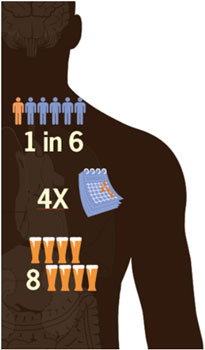Related Posts
//
Kudos to Jessica Boten, Liz Chen and fellow Health Behavior students at UNC
Last week, Master of Public Health student Jessica Boten’s opinion piece (developed in Professor Kurt Ribisl’s Theoretical Foundations of Behavioral and Social Science class) on binge drinking ran in the Daily Tar Heel. Sunday Nov. 25, The Herald Sun (Durham, N.C.) ran a similar article by MPH student Liz Chen. Liz and Jessica shared the true facts about binge drinking. The facts are shocking, appalling and frightening. The Centers for Disease Control and Prevention summarized the national toll of binge drinking (see sidebar). We know that 80,000 deaths and more than $223.5 billion is way too high a price when most of those deaths and dollars could be avoided.
| Binge drinking is highest among adults aged 18 to 34. More than 38 million US adults binge drink, about 4 times a month, and the largest number of drinks per binge is on average 8. This behavior greatly increases the chances of getting hurt or hurting others due to car crashes, violence, and suicide. Drinking too much, including binge drinking, causes 80,000 deaths in the US each year and, in 2006 cost the economy $223.5 billion. |
If we want to reduce binge drinking, we’ll have to deal with societal realities. Drinking is legal although aspects of it are controlled (e.g., age at which alcohol can be purchased/served, hours of service and certain other conditions). Alcohol is served at most adult social functions. Alcohol doesn’t have the negative health and legal connotations of tobacco or illegal drugs. Many parents are relieved that their children drink rather than use illegal drugs. Bars are a ubiquitous part of college towns. Alcohol is served at many events on campus (but only in the evenings and only to those with valid ID to show they are of age). While binge drinking is most frequent among those 18-34, no age group is immune.
Binge drinking is a national problem. It’s also a problem here in idyllic Chapel Hill. UNC Bowles Center for Alcohol Studies data indicate that 43.5 percent of UNC Chapel Hill students reported binge drinking in 2011. Liz Chen and Jessica Boten made it personal by putting names on some of the tragic deaths here.
Until we put binge drinking on the table and look at it straight on, we’re not going to control it. Until then, we’ll react with shock and sadness when UNC students’ lives are cut short tragically. Fortunately, there’s good evidence about how to reduce binge drinking and underage alcohol use. It’s time to make a commitment to reduce binge and underage drinking in Chapel Hill and across the U.S. Thanks to Jessica Boten and Liz Chen for educating us about one of the biggest and most preventable public health problems in our midst.
Happy Monday. Barbara

